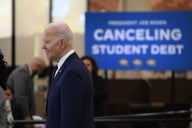You have /5 articles left.
Sign up for a free account or log in.

A for-profit college based in Washington, D.C., that offered IT and health-care programs shut down in May 2023 after the Education Department cut it off from federal financial aid—one of 35 institutions in the last three years that have lost access to the funding source that’s a lifeline for most colleges.
But the department didn’t say anything publicly about its decision to take action against Prospect College after it found evidence of an "illegal scheme” to evade the so-called 90-10 rule. Under that rule, only 90 percent of a for-profit college’s revenue can come from federal financial aid. Prospect counted institutional payments to students as revenue to the college to keep its federal revenue under 90 percent, and when the department recalculated the college’s revenue for fiscal 2019, 2020 and 2021, the college failed the 90-10 standard all three years.
The department’s Jan. 31, 2023, finding against Prospect was disclosed along with dozens of others earlier this month, when the department released information about its enforcement efforts on a new webpage that will serve as the hub for future fines, settlements and termination actions. It is now public knowledge that the Office of Enforcement at Federal Student Aid, the agency within the Education Department that oversees the federal financial aid system, has taken 87 actions in all against 85 colleges and universities over the past three years.
The disclosures are part of a new effort to increase transparency into the enforcement office’s work since it was revived by the Biden administration. Some of its more high-profile decisions have been released through press announcements, such as a $37 million fine against the online giant Grand Canyon University issued last October, but the majority have flown under the radar till now. (Most recently, the Education Department fined the Culinary Institute LeNotre $275,000 as part of a settlement agreement after finding that the Texas-based for-profit college misrepresented the employability of its graduates.)
This glimpse into the enforcement office’s work comes as the department is conducting an overhaul of Federal Student Aid—and with a presidential election on the horizon that could shake up the agency. The office, which was first created in the last year of the Obama administration, has been subject to political whims. Under the Trump administration, it was “deprioritized,” according to current Education Department officials who re-established it in October 2021.
Headed up by Kristen Donoghue, a former enforcement director of the Consumer Financial Protection Bureau, the office investigates potential misconduct, analyzes claims for debt relief from students who say they were defrauded and fines institutions, among other responsibilities.
“We investigate schools that are suspected of wrongdoing and take actions to hold schools accountable when we find evidence,” Donoghue said. “We want to ensure that schools do not put their interests ahead of students’ interests, and we are confident that the actions we take to hold schools accountable protect taxpayers who fund postsecondary education in addition to students.”
Over all, since October 2021, the office has issued 39 fines totaling $61.7 million and reached settlements with eight colleges, while yanking federal financial aid eligibility from nearly three dozen. It’s impossible to say how much of a stepped-up effort that represents, since the webpage doesn’t include enforcement actions under the Trump or Obama administrations. But department officials hope that the disclosures will be helpful for institutions who want to comply with federal rules and regulations—and will inform students and families as they think about which college to attend and which ones to steer clear of.
The latter category might include McDougle Technical Institute, which lost access to federal financial aid on Dec. 30, 2022.
The small Florida-based for-profit, which offers programs in cosmetology, barbering and massage therapy, showed a “callous disregard” for its students’ welfare, the department found. The college was accused of falsifying student attendance, disbursing federal financial aid to ineligible students, failing to give COVID relief funds to students and pressuring students to take out loans. In some cases, students were unaware that they had loans until department staff told them, according to a letter sent to the college. McDougle contested the decision and appears to continue to operate.
‘Need to Go Faster’
The data dump belatedly fulfills a March 2021 request from a coalition of consumer protection advocates and organizations focused on higher ed accountability. Some of those advocates said this month’s release of information was helpful—but that they’re generally disappointed in the office’s actions, now that there’s a fuller accounting of them.
The enforcement actions have been fairly standard; nearly half related to failures to comply with federal campus safety laws or federal reporting requirements. Of the colleges that lost aid eligibility, 13 lost it because they were no longer recognized by an accreditor—a baseline requirement for accessing federal financial aid.
Advocates had hoped that the Biden administration’s Education Department would move more aggressively to go after universities that have misled or defrauded students, either with larger fines or revoked eligibility for federal financial aid.
“The enforcement effort is more serious, but has moved more slowly than the urgency of the problem requires,” said David Halperin, an attorney critical of for-profits. “I am impressed, but they do need to go faster.”
Halperin did appreciate this month’s disclosures. He said he raised concerns about Prospect College with the Education Department after Biden took office, but he didn’t receive any word about the institution losing access to the financial aid until the enforcement office posted its documents online this month.
Donoghue, chief enforcement officer at Federal Student Aid, said in an interview with Inside Higher Ed that her team will “always go where the facts take us and take action where we think it’s appropriate.”
“We have been very focused on building an investigation team that has skills in the background needed to do these investigations, and we have brought some actions that we think are very significant and warranted,” she said. “And we will continue to do that.”
Donoghue has worked to rebuild the office’s investigations team and put in place other tools that she relied on at the CFPB to “make sure oversight work is robust and complete.” That includes using undercover agents commonly known as secret shoppers to identify potentially deceptive practices and launching a tip line for “knowledgeable insiders” to share information about potential misconduct. So far, secret shopping has been used “at a number of schools,” Donoghue said, informing decisions about whether to proceed with an investigation.
“It’s a very valuable tool in our toolbox,” she said.
Will the office’s work over the last three years make it more resilient with a coming a change in administration, particularly if former president Trump returns to the White House? Donoghue said that while she didn’t have a crystal ball, “student and taxpayer protection is a nonpartisan issue.”
Halperin and other advocates who’ve followed the department’s enforcement work for years have noticed changes. He sees a new emphasis on enforcement “as opposed to a culture of labeling the school partners and bending over backwards to sweep violations under the rug.” That matters, he said, because “it tells schools that it’s time to behave and that having federal aid is a privilege.”
“At the very end of Obama, they started to wake up to all this stuff,” Halperin continued. “But there was still a lot of work to be done to overcome the history of institutional reluctance and avoidance of controversy or confrontation with institutions.”
But Thomas Jones, who leads the American Accountability Foundation, a conservative nonprofit, said that the Office of Enforcement “has been prosecuting a years-long vendetta against career colleges.” Others who represent for-profit colleges have also accused the Education Department of unfairly targeting career colleges via regulations and other actions.
“The office’s myopic focus on a sliver of the higher education landscape has come at the expense of ignoring abuses at traditional universities that often saddle students with over $100,000 in student loan debt with little prospect of gainful employment,” Jones said. “The only explanation for the Office of Enforcement ignoring traditional four-year universities is that liberals in the administration want to protect their traditional allies in academia."
Barmak Nassirian, vice president for higher education policy at Veterans Education Success, an advocacy group, said enforcement is one area where the Biden administration hasn’t “managed to soar as high.” He did give the Education Department “superlatively high grades” for their efforts to provide debt relief to students who need it, including those misled by their institutions about the value of their college educations.
“I wish they had more bandwidth to fix everything,” he said. “In some ways, I can’t blame them.” But “when abusive practices are normalized, it becomes a real challenge to change the culture of the regulated community. It’s not a couple of bad spots. This is a royal mess clear across the board.”
Nassirian noted that the department has limited tools to address noncompliance with federal rules—something he partly blames on congressional inaction. He acknowledged that the department has tried and put measures in place such as secret shopping to “improve the regulatory framework so that enforcement could be more meaningfully applied.”
“But have they cleaned it up?” he asked. “The answer is no.”








